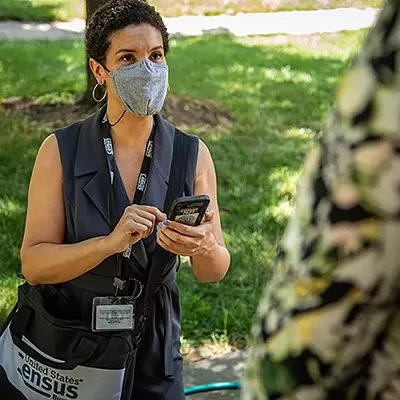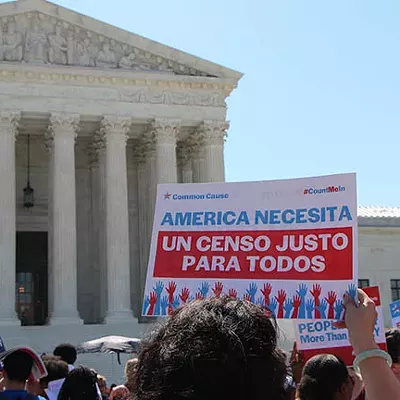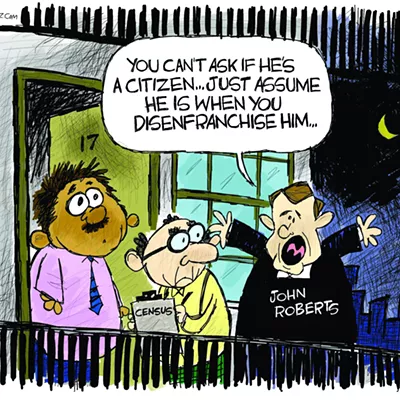Like many of those employed by the Census Bureau in Southern Arizona last year, Kent Christofferson didn't get paid for much of the time he worked. Unlike most of the others, however, he isn't quietly accepting the federal government's shaft job.
A retired navy veteran of 20 years, the 45-year-old Christofferson began working on the census in 1999; by February of last year he was a field supervisor in Pinal County. The job meant a lot of driving from his Marana area home, and a lot of long hours.
The unwritten rule among census employees was that while administrators wouldn't approve overtime, the practice of "banking" hours to be paid at a later date was allowed. But in May, Susan Lavin, director of the Census Bureau's regional office in Denver, put a stop to that practice, calling it "unacceptable and fraudulent."
That decision placed census field workers in a Catch-22 position. Their bosses, who had to approve any overtime pay, wouldn't do it. Instead, they told census takers the extra hours either had to be donated, or else they could look for another job.
Christofferson, however, kept track of his unpaid overtime hours and by June had amassed almost 500. Not only did Christofferson have to oversee a huge geographical area, but he says he and other employees were forced to work overtime by Lavin's desire to finish the door-to-door head-counting quickly (see "Workin' For Big Brother," June 8, 2000). The job, he says, "was originally scheduled to be completed in eight weeks, but employees out in the field were mandated to complete this project in less than six weeks. To make this goal, the field managers were told to get the [census] questionnaires in no matter what."
Former census field supervisor Jenny Magee of Kearny agrees. She remembers, "Under the time restraints and the workload we had, it was at times just impossible to only put in eight-hour days and 40-hour weeks. If we turned in overtime it would be rejected, so we put in a lot of time we didn't get paid for. We were told we were doing a service for our country. It is really sad, that out of a sense of duty and because of our belief in the extreme importance of an accurate and true census count ... [we] put in long hours that many times we never got paid for."
Unlike most census workers, however, in a June letter to Secretary of Commerce Alexis Herman, Christofferson publicly complained about the lack of overtime pay. After explaining his situation, he asked Herman, "If the Bureau of the Census is allowed to break the law, how can we expect any other employer to honor constitutional laws?" Then he stated, "I believe that my employment with the Census will be terminated when this complaint is received."
It took his local census bosses a few weeks, but after unsuccessfully trying to get him to resign, they fired him. Even though the official reason given for his dismissal was "openly questioning management decisions after a thorough explanation was given to him," Christofferson states emphatically, "My termination had everything to do with the June letter. I was fired because of that letter."
Having been cheated out of thousands of dollars of overtime pay, Kent Christofferson didn't let a little thing like his firing stop him. Instead, he filed complaints over his lack of pay and his termination. At the same time he talked to other census workers who had similar experiences, and then he went looking for a lawyer.
He found Edgar James of a Washington, D.C. law firm, and they conducted a limited survey of some Southern Arizona census workers. The results, James says, show that 15 local employees listed pay problems. James says, "Not surprisingly with the government, a lot of people were told to get the job done and then were never paid for the overtime required to do it."
One of those was Sharon Wolf of San Manuel, who drove hundreds of miles a day throughout Pinal County doing her census supervisory work while accumulating 300 hours of unpaid overtime. "We were told we'd only get paid for eight hours a day but the job would probably take longer," Wolf says. "You did it if you wanted to keep working. If you complained about the overtime, you were told, 'If you don't want to do it, somebody else will.'"
Wolf believes the rush to get the census work done quickly not only contributed to the unpaid overtime problem, but also affected the reliability of the information: "I don't think the results are accurate at all because of the deadlines. A lot of things were guessed at. The projects were totally compromised by asking for 12- and 14-hour days but paying for eight."
Attorney James says it will be a couple of months before he decides whether to represent former census workers in a lawsuit. Kent Christofferson thinks there are many more employees, both locally and nationally, who weren't paid for overtime work but who are afraid to speak out for fear of retribution by the federal government through withholding job opportunities or other means.
Meanwhile, Christofferson has filed two claims against the government, one for wrongful termination, the other to recoup his lost overtime pay; the latter has been denied. A few weeks ago, Christofferson says, a Commerce Department attorney, who refused to discuss the case with the Weekly, offered to settle the wrongful termination complaint by paying him $2,000 and changing his record to show that he had resigned his census job. But the offer also required him to drop the overtime pay charge, something Christofferson refuses to do, citing the government's tactics of implied intimidation toward former census workers as a factor. "I can't let it drop. I hate it when the government uses someone's fears against them."
Denver census head Lavin declined the opportunity to discuss this issue. But Chip Walker, deputy staff director of the U.S. House of Representatives subcommittee on the census, says that panel has heard from every part of the country about pressures to finish the census field work quickly. "Meeting the deadline was more important than the quality of the work," he says, and he wonders how much more accurate the results might have been without the time pressures. Walker calls it unfortunate that some census workers are frightened to speak out about the overtime pay issue, and urges them to contact the subcommittee.
Two hundred and twenty-five years ago, the authors of the Declaration of Independence understood the natural tendency of people to be cowered by their government. They wrote, "all experience hath shewn, that mankind are more disposed to suffer, while evils are sufferable, than to right themselves."
In Tucson, Kent Christofferson laments that many former employees refuse to stand up against the Census Bureau's overtime pay scam. "There is a large fear of speaking out against the government. People are afraid to respond. You'd think we were in Romania. Government has all the power and people won't buck it."
But he keeps trying.









